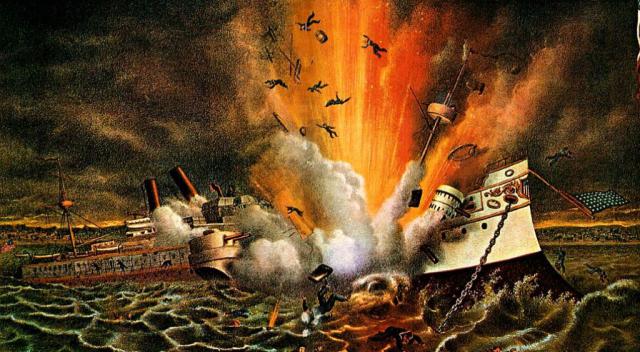This Day In History: February 15th
February 17, 2017
On this day in 1898, the USS Maine experienced a massive explosion and sank in the Havana harbor in Cuba; 260 men out of less than 400 on the ship died due to this tragedy. This $2 million ship was one of America’s first battleships, built in response to the increasing naval power of Latin America. This age of American history is infamous for the quickly growing sentiment of Imperialist ideals. Imperialism is a political ideology that a nation will extend and consolidate power through means of military action or diplomacy. There was a myriad of different reasons as to why America would want to join the rest of the world powers in the age of Imperialism, and this tragedy gave them the opportunity to do so.
Cuba, under Spanish rule, was miserable. General Valeriano Weyler set up concentration camps for insurrectionists to try and crush the rebellious sentiment, but thanks to the rise of influence that Yellow Journalism had in America, the people were convinced that it was their duty to help this country fight its oppressive ruler, Spain, just as how France assisted America in fighting Britain during the Revolutionary War. Yellow Journalism was how names like Joseph Pulitzer and William Randolph Hearst gained popularity. Through greatly exaggerating news stories, they were able to make a lot of money and gain a lot of power due to their control of information through the use of their eye-catching headlines.
The USS Maine was in Havana Harbor in order to protect US interests during the revolt when suddenly, the ship blew up and sank very quickly. After a board of inquiry investigated the tragedy, results were inconclusive. However, men like Pulitzer and Hearst saw this as an opportunity to influence the public to adhere to their own ideas. Therefore, they wrote articles stating that the Maine was blown up by a mine, slyly suggesting that Spain was behind this assault on the American navy. While this event was not the reason for American involvement in the war, it was definitely the catalyst that sped up the process.
McKinley asked Congress to authorize war, and Congress agreed. This was on the condition that he adhere to the Teller Amendment, which stated that Cuba would not be placed under permanent control by the United States. An armistice was signed on August 13, 1898, almost four months after its start. The Treaty of Paris (1898), signed in December, stated that Spain would give Cuba independence, while ceding power of Puerto Rico, Guam, and the Philippines to the United States. To compensate, the US gave Spain $20 million.
In 1901, while America did not control Cuba, they tried to keep an influence over them by forcing them to sign the Platt Amendment, which would cause a lopsided relationship between the two. Cuba would not be allowed to make alliances with any country that would endanger its independence. America reserved the right to interfere in Cuban affairs in order to maintain their government. Guantanamo Bay was established as a naval and coaling station for American ships. These were some of the conditions of the Platt Amendment, which was seen as unfair to the people of Cuba.
In conclusion, the USS Maine was the stimulant for the aforementioned events. America became an Imperial nation, Spain lost a lot of its power, and yellow journalism proved to be an effective mean of controlling the American public.


